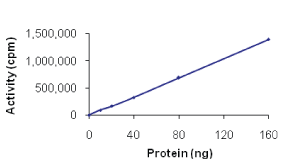
CAMK2 gamma, Active(C14-10G)
FOR BULK ORDER REQUESTS PLEASE CONTACT US
Description :Recombinant human CAMK2gamma (c-terminal truncation) was expressed by baculovirus in Sf9 cells using an N-terminal GST tag.
Species :Human
Tag :GST tag
Expression System:Sf9 insect cells using baculovirus
Sequence :c-terminal truncation
Genbank Number :NM_172169
Specific Activity :Sample Kinase Activity Plot. For specific information on a given lot, see related technical data sheet.
Purity :Sample Purity Data. For specific information on a given lot, see related technical data sheet. 
Storage, Stability and Shipping :Store product at –70oC. For optimal storage, aliquot target into smaller quantities after centrifugation and store at recommended temperature. For most favorable performance, avoid repeated handling and multiple freeze/thaw cycles.
Applications :Kinase Assay, Western Blot
Molecular Weight :~60 kDa
Gene Aliases :CAMKG, CAMK, CAMK-II, MGC26678
Scientific Background :CAMK2γ is a member of the CAMKII family which are ubiquitous serine/threonine protein kinases that have been implicated in diverse effects of hormones and neurotransmitters. CAMK2γ has six alternatively spliced variants that encode six different isoforms. Some of these variants have been identified in human tumors (1). Transgenic mice expressing a partially calcium-independent mutant form of CAMKG showed 1.5- to 2-fold increase in the thymus of these mice, at least in part due to an increase in the life span of double-positive thymocytes (2). There was an increase in the number of T cells in the secondary lymphoid organs that had acquired an antigen-dependent memory phenotype.
References :
1. Tombes, R. M. et al: Identification of novel human tumor cell-specific CaMK-II variants. Biochim. Biophys. Acta 1355: 281-292, 1997.
2. Bui, J. D. et al: A role for CaMKII in T cell memory. Cell 100: 457-467, 2000.
Product Sheets (By Lot #) :
Research Areas :Neurobiology, Cardiovascular Disease, ERK/MAPK Pathway, PKA/PKC Pathway, Ser/Thr Kinases, Neurobiology, Cardiovascular Disease, ERK/MAPK Pathway, PKA/PKC Pathway, Ser/Thr Kinases
